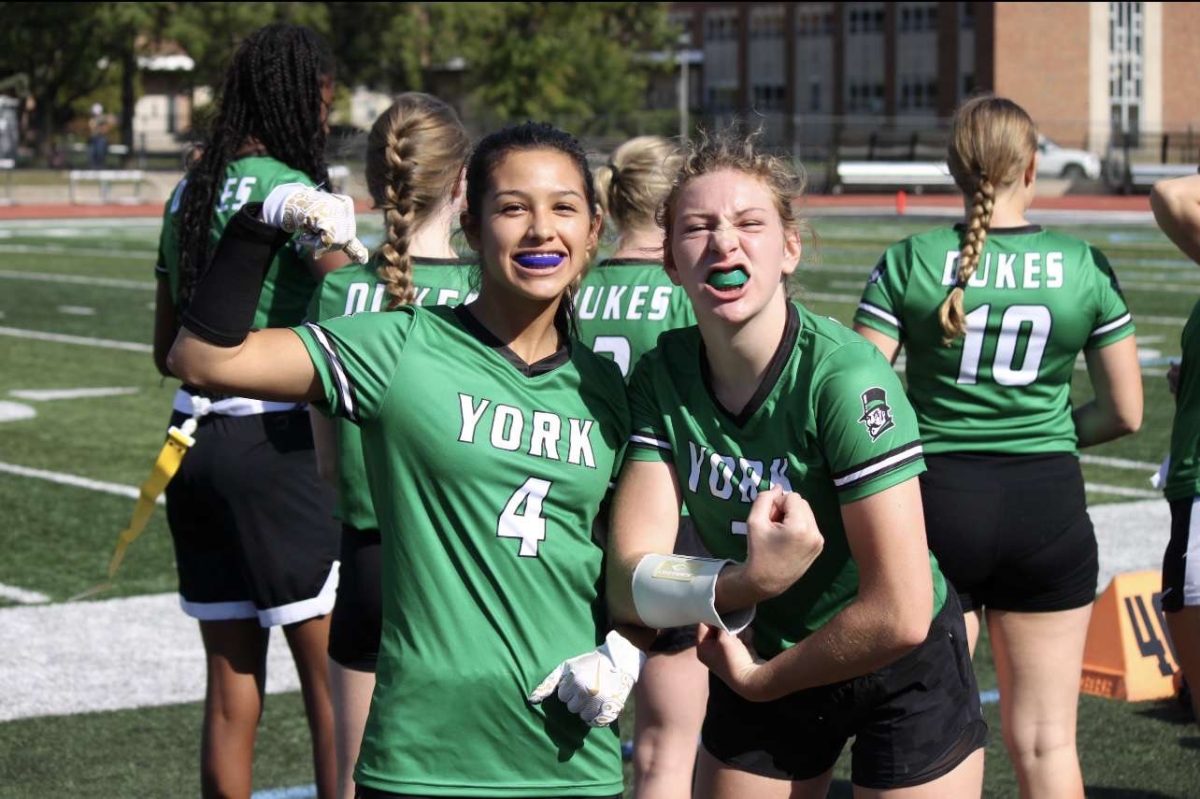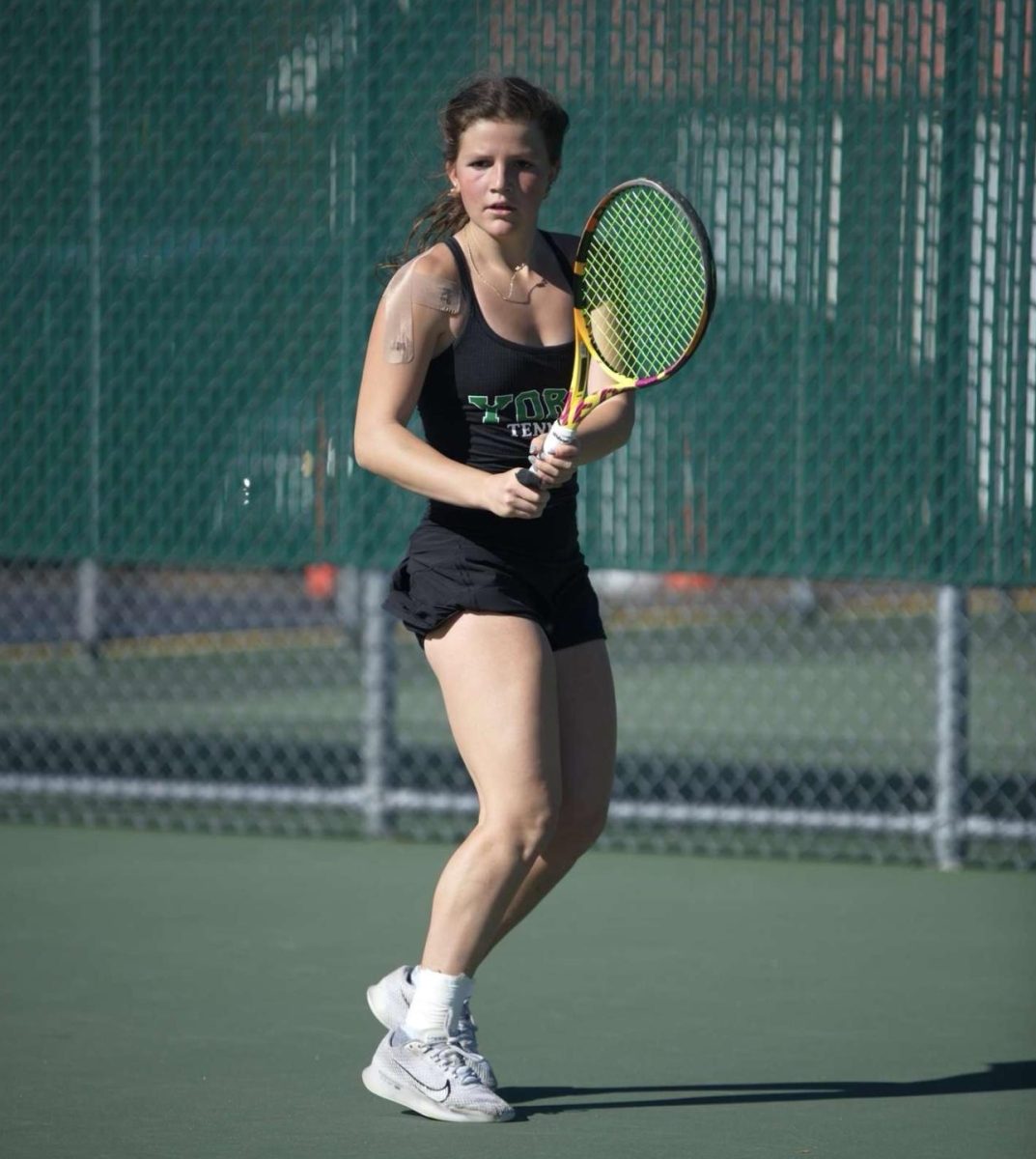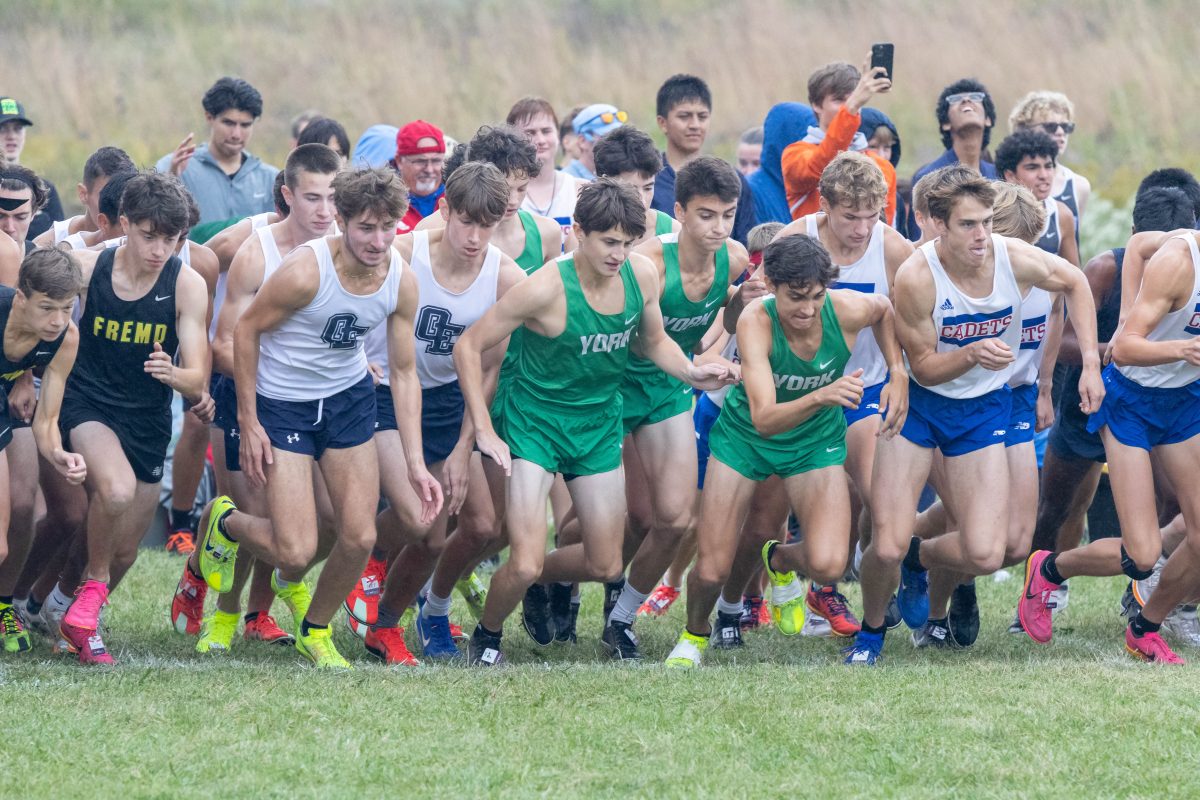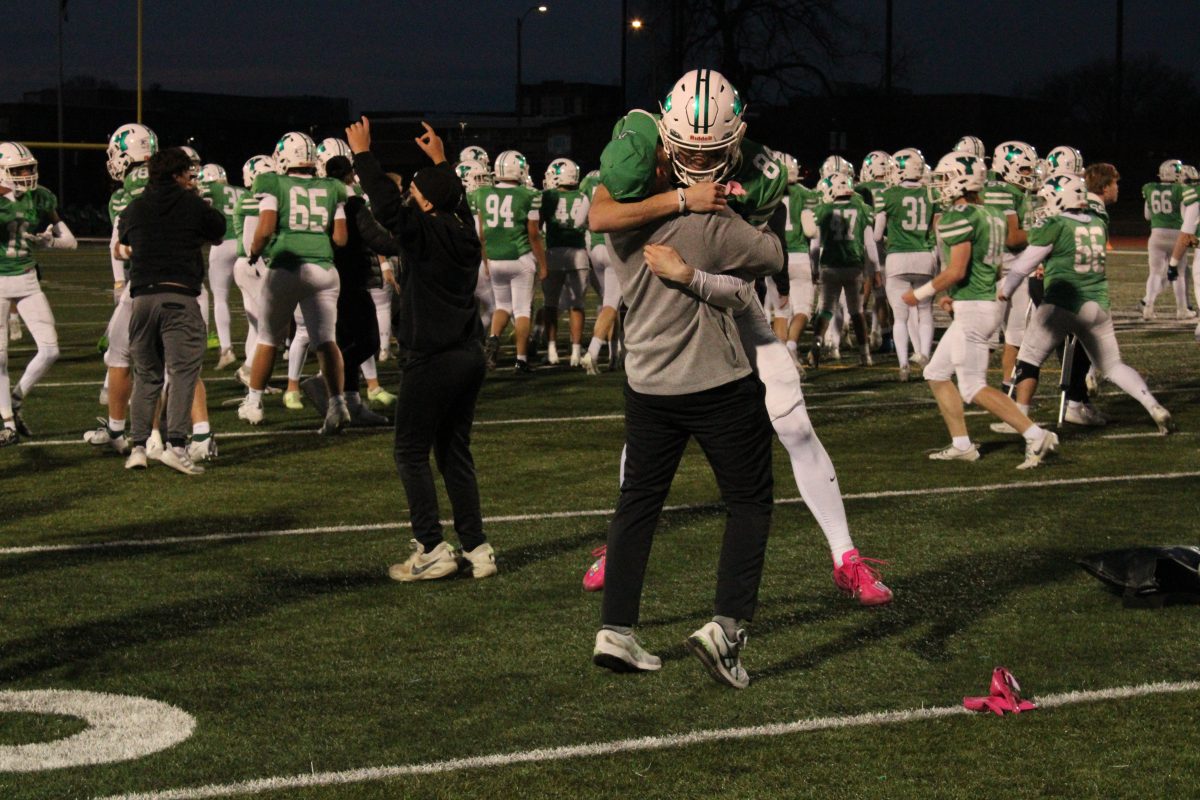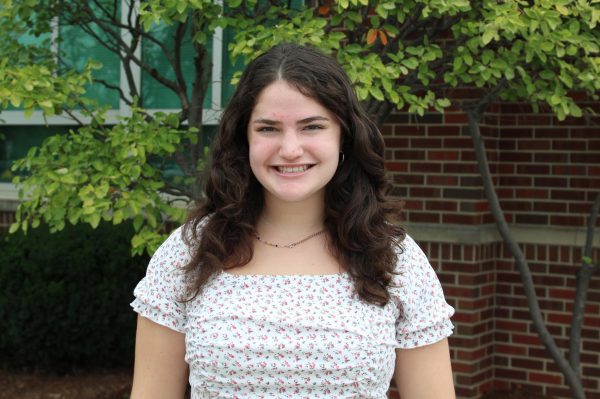Working for a professional sports team is a goal that many athletes set for themselves post high school. For Justin Sata, this dream began to unfold when he was only eight years old. Sata’s love for hockey started at young age, and having a father who is president of the AHL Chicago Wolves Hockey Team helped him realize that passion. Justin has been working with the AHL team since he was in third grade, and now as a freshman, Sata offers his expertise to the York Hockey Club.
Sata has always been an athlete at heart. His hockey career ended prematurely, with the diagnosis of a neck condition that leaves him more susceptible to being paralyzed. Additionally, Sata was born with Achondroplasia, a type of dwarfism that is characterized as having an average waist and shorter limbs, which ultimately limited his progression in baseball.
“Justin has always found a way to get involved in sports, even though physically he had some limitations that he couldn’t actually play some of the sports,” Sarah Sata, Justin Sata’s mother, said.
Sata’s involvement in athletics went beyond hockey. When he wasn’t playing sports recreationally with his friends, he was helping out on the sidelines and in the dugout.
“I did baseball for a little bit, and then I was the baseball manager for my house league,” Sata said. “That was just a lot of my friends and that was fun. I did it until I was in about seventh grade. I also had a lot of friends who play football, so I was the waterboy for the Eagles for a while too.”
The news of Sata’s inability to play sports was hard at first, but Sata quickly found different ways to stay involved in the sports world. Shortly after he found out that he could no longer play hockey, Sata went to a Chicago Wolves game with his dad.
“I was still obsessed with [hockey],” Sata said. “I still went skating with my friends and all of that. When I was eight, I was at the wolves game with my dad and we had gone early because it was also girl scout night for my sister. The other president, Courtney Mahoney, came up to me and asked me to come to the locker room.
She had kind of gotten me set up with it.”
Mahoney offered him a position as a stick boy, and Sata had started to take on responsibilities over time.
“He really got involved. He loves the sport, he bonds with a lot of the AHL players, and was just invited to keep working in the locker room,” Sarah Sata said. “He helped with little stuff at first, now he’s sharpening skates and having some real responsibilities for the team.”
Having been with the Chicago Wolves for six seasons, he has realized that his management role could be a lifelong endeavor.
“When I was eight years old I kind of just thought, ‘oh this cool, I’m in the locker room with Chicago Wolves players,’” Sata said. “Then, when I got older and was learning more about it, I realized I could do this as a career. This year and last year is when I fully dedicated myself to it.”
Equipment management is a big task to take on. At the wolves Sata works with three other equipment managers, but for York Hockey Club, it’s just him. Sata gets the bench set up for the guys, helps with warm ups, is prepared to fix and sharpen skates and keep track of helmets and sticks.
“This is the first ever time that York has had an equipment manager, so we are kind of learning day by day, but Sata is very prepared,” Matthew Boeing, York Hockey Club coach, said. “He gives all three of our teams the pro experience of sharpening skates, taking sticks, and making sure the locker room is good to go. We wouldn’t be able to run as smoothly as we do without Sata.”
Sata comes prepared for every practice, not only with the physical equipment needed, but also with the expertise and experience that he has gained from working with the AHL team. Sata’s preparedness is just one of many qualities that contribute to his work ethic.
“He’s very prepared, very thoughtful, very polite, and he loves hockey,” Boeing said “He started off helping with the varsity, and now he’s the equipment manager for all three teams, and a volunteer coach on the varsity program.”
His tendency to take on responsibilities and connect with the people he works with is what makes Sata a strong asset to the team. However, Sata still faces challenges in the way he is initially perceived, both in the rink and in daily life.
“Dwarfism leads you to challenges every day, and a lot of them are the same challenges,” Sata said. “The main challenge is being a small guy. Something that a lot of people don’t understand with dwarfism, is that I can do anything that average height people can do.”
Sata often feels like people underestimate him because of his smaller stature. However, he argues that his dwarfism has made him more resourceful.
“If you look at my house, there are stools everywhere,” Sata said. “My parents are average height, but there are stools so I can reach the sink, and things on the light switch. Everything in this world is built for average sized people, so there are challenges, but there are also ways I can face those challenges.”
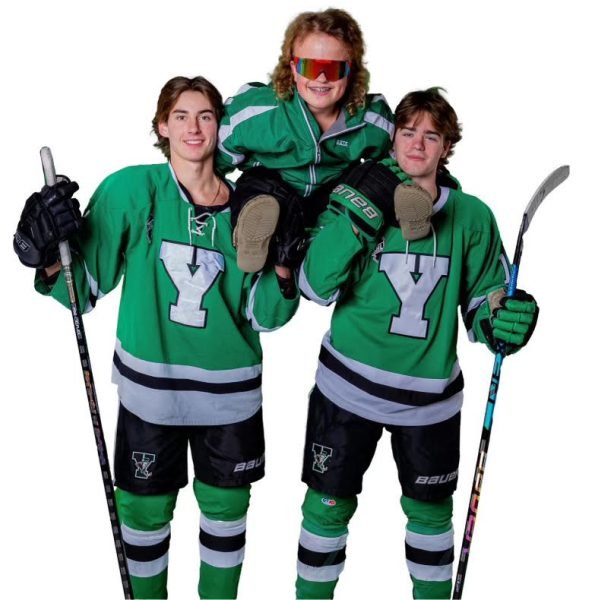
Sata also combats these challenges by finding his own ways to go about tasks. In his daily life, he uses chairs and stools to reach things. At the arena, he has an alternate way of setting up the locker room and doing the laundry for the players.
“I do everything my way,” Sata said. “If you look at how I set up the locker room and how my boss would set up the locker room, it ends up looking the same way, but I would do it differently. When I was young I would always ask someone for help, but I have learned ways of doing things.”
Sata’s ability to adapt in his day to day life, has allowed him to become a more active problem solver in everything he does.
“It’s really cool to see how he can move on the fly and adapt,” Boeing said, “If something happens on the bench, he is the first one to grab a stick, grab a helmet, he is just already kind of a step ahead.”
Although dwarfism limits how outside individuals view Sata, it has never limited his true potential. His ability to overcome obstacles speaks to both his work ethic, and his character.
“I’m just so proud of him for all he has overcome,” Sarah Sata said. “Being a little person, obviously your appearance is different right away, but he has definitely embraced it. We taught him very young that if people are staring at you, introduce yourself. We are very proud of him for being so outgoing and not having to set any limits for themselves because he has that physical difference.”
Sata has always been an advocate for himself, and in doing so, he also works to advocate for all little people. Many of the social challenges he faces are the result of limited representation of people with dwarfism.
“A lot of people describe Dwarfs as ‘midgets’,” Sata said, “It’s a slur for Dwarfs. Some dwarfs are fine with it, but most dwarfs think it is a slur. That’s a big thing that I wish more people knew about dwarfism, is that it’s not how you describe a dwarf.”
Sata also realizes that, as far as he knows, he is the only equipment manager out there with dwarfism. While lack of dwarfism representation has not limited Sata’s ambitions, Sata believes that it has limited the perspective of others.
“Being a freshman, there are people from all the different middle schools, and a lot of them have never seen a dwarf before,” Sata said. “I can tell that they are treating me differently.”
One of Sata’s bigger grievances is being treated like he is less capable. As previously stated, Sata’s dwarfism does not often limit his ability to complete daily tasks, but many assume that he is someone in need of help.
“Sometimes people do stuff for me that I don’t need them to do,” said Sata. “Even when there is something my height, people will just reach over and grab it for me.”
While Sata understands that people are trying to be helpful, he also wants them to know that he is capable. Growing up, Sata was always encouraged to be independent. His parents were aware that many children with Achondroplasia were coddled in their opinion, and this had affected their development. Both Sata and his parents did not want that for him.
“When he would struggle with something [as a kid], of course we would help him, but we would also tell him that you have to figure it out or get your step stool,” Sarah Sata said. “Making sure to give him the tools to succeed and not feel different or feel like he always needs to ask for help.”
Despite Sata’s occasional road blocks, he still finds solace in the genuine friendships and community that he has found in York Hockey Club and the Chicago Wolves Hockey team. Equipment management has given him the opportunity to not only be a part of a team, but feel a part of a family.
“I do feel a part of the team,” Sata said. “Especially in York, I see these guys every day, and for the first two months of the season, we were with each other every single day. The team is like a second family to me, with everyone being so close to each other.”
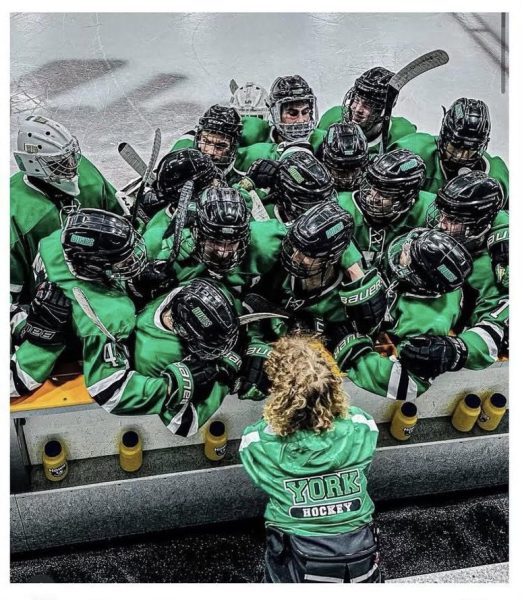
Photo courtesy of Sarah Sata




